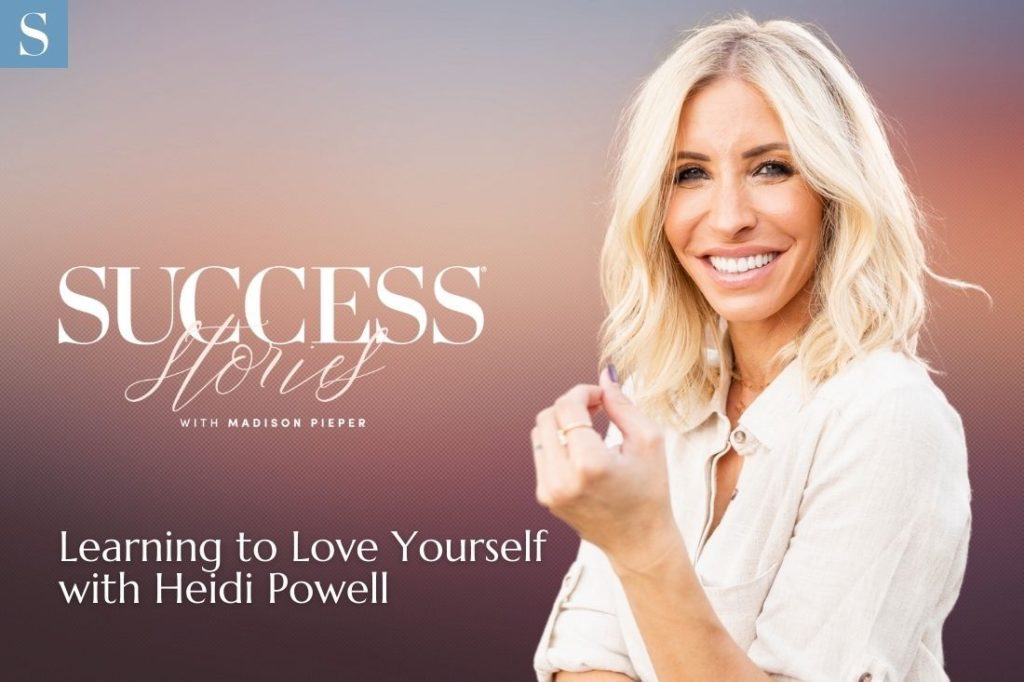Trigger warning: This post references eating disorders.
If your method of taking control is pressing on the accelerator, it’s time to give yourself a break.
Heidi Powell became famous as a personal trainer on the reality show Extreme Weight Loss, opposite her then-husband Chris Powell.
But it took facing her own exercise- and food-related issues, the couple’s divorce in May 2020, and finding new love with Dave Hollis for her to learn that letting go—not taking control—is ultimately what leads to inner peace.
Today, Heidi is in the process of balancing being a mom of four with a busy career. In addition to being a New York Times best-selling author, she competes in physique competitions.
“I am my best self now, more so than I have ever been, and a lot of it is because I am more physically healthy and mentally healthy than ever,” she says.
On this episode of SUCCESS Stories, Heidi tells SUCCESS’s Madison Pieper how giving up control made her feel more relaxed, and they talk about her definition of balance and what health really means.
Health isn’t just physical.
When we think about what it means to be healthy, we often focus on the physical aspects of our lifestyles.
As Heidi says, “When I heard [the word] ‘health,’ I thought of it as, ‘Am I working out six days a week? Am I eating five meals a day? Am I counting my macros? How am I looking? How much can I lift?’”
But after her divorce from Chris, she realized that she had been prioritizing these physical elements of her life to the detriment of everything else.
“I realize now that if you’re not giving attention to your mental, spiritual and emotional health and you’re not resting, you’re not taking time for you, the physical does not matter,” Heidi says. Eventually, this neglect will catch up with you, to the point that you won’t even be able to maintain your workout and diet. “The physical will burn out at some point,” she says.
Now, she’s learned that taking it easy can be just as fulfilling as completing a grueling workout. “We actually rested all day on Sunday, which I never did before,” Heidi says. “It ignites me, and it makes me excited for the week.”
Feeling strong and nourished in your body is important to your overall health. However, it’s only one factor. You need to complement it by taking time for those other aspects of your life, too.
If you need to feel in control, you’re not.
Feeling like you’re in control of a situation can give you a sense of security. But it may be deceptive. When your desire for control turns into a need, you’re actually ceding power to whatever it is you’re using to feel in charge.
In Heidi’s case, that was food and exercise. She felt that if she could use restriction and workouts to make her body look a certain way, she would be able to get what she wanted: someone to love her. However, her obsession with dieting and exercising took over her life. When she started binging and purging, she felt even more powerless.
It was only when Heidi accepted that she couldn’t treat her anorexia and bulimia herself, and put her trust in a coach to help her, that she was able to break free of these obsessive patterns.
Even if you don’t struggle with disordered eating, we all have areas of our lives where we try to control too much, and only end up creating more stress for ourselves.
For example: Have you ever let a comment from your social media upset you, or make you angry? Are you still annoyed about it?
As a public figure, and specifically as someone who has gone through a very public divorce, Heidi is all too aware that the comment section can be a dangerous place to dwell. However, she’s learned that just because people feel the need to share their opinions about her life, doesn’t mean she has to read or engage with them.
“Getting upset by comments is another form of control,” Heidi says. “And over the last two years, I have had such a beautiful relationship with releasing control. Releasing control of what somebody’s saying about me is part of that. They’re entitled to their opinion, but that doesn’t mean I want to read it.”
Consider this permission not to read the comments.
Balance is always a work in progress.
If you’re the kind of person who is always pushing yourself to do your best in every area of your life, brace yourself for a revelation: You probably won’t ever have everything perfectly balanced. Another revelation: That’s OK!
As Heidi says, “I don’t believe in balance. … But I am always balancing.” She’s constantly assessing where she’s putting her time and energy so that when one part of her life is getting too much attention, she can recalibrate and adjust her schedule accordingly.
She admits that it’s a process of trial and error. For example, if she accidentally misses one of her children’s baseball games and sees it having a detrimental effect on their relationship, she knows for next time that that’s something she can’t compromise.
Another important factor to consider in this balancing act: You get to choose what “balancing” looks like for you. Different people have different priorities, and only you know what you need to put first in order to live your life in a way that best suits your needs.
One thing Heidi always chooses is happiness. “Everybody has the right to choose what they want,” she says. “They can choose to struggle, they can choose whatever. I’ve chosen to be happy.”
SUCCESS Stories with Madison Pieper is no longer releasing new episodes on the SUCCESS Podcast Network, but you can still listen to the full conversation below.











